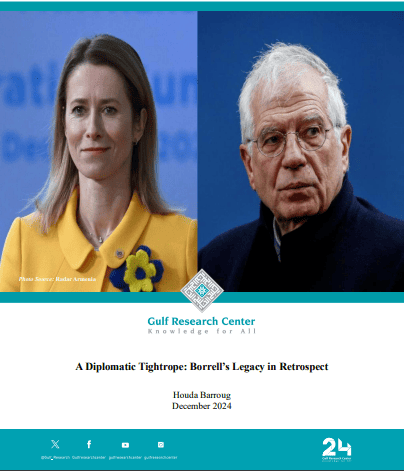
Joseph Borrell's term as the European Union's High Representative for Foreign Affairs and Security Policy ended on November 30, 2024. His tenure was characterized by major hurdles and limited success in changing the EU's Middle East strategy. Throughout his time, the region remained a source of international concern, with persistent conflicts, geopolitical tensions, and humanitarian crises requiring regular attention from European politicians. Due to its response to the development on the ground and the divisions among EU member states, the EU’s credibility has been damaged in the Middle East.
Borrell's approach to the Middle East was marked by efforts to keep the EU relevant in an area where its influence had been dwindling for years. His mandate inherited a complex situation, with the EU striving to develop a clear strategy amidst divergent member states' interests and the increased engagement of other global powers such as the United States, Russia, and China.
One of the most significant issues Borrell faced was the lack of a comprehensive EU policy for the Middle East. Despite the region's physical proximity and recognized strategic importance, the EU was unable to adopt a coherent strategy akin to those for other regions such as the Sahel or Central Asia. This lack of a unified policy has resulted in inconsistent crisis responses and hindered the EU's capacity to have a substantial impact on regional dynamics.
This is most evident when it comes to the Israeli-Palestinian conflict. In conformity with international law, the EU has continued to advocate for a two-state solution, with Jerusalem serving as both states' eventual capital. However, the EU's capacity to influence the peace process was impeded by internal disagreements among member states and dwindling prospects for a negotiated agreement. Borrell fought to retain the EU's relevance in the face of unilateral acts by numerous parties and shifting regional coalitions, represented as the Abraham Accords.
Despite the EU's best efforts to downplay the conflict in favor of regional normalization, the events of October 7, 2023, violently brought it back to the forefront. This unexpected renewal of hostilities revealed the EU's long-standing passivity, as Borrell himself honestly confessed that the EU had "done nothing for 30 years" to adequately address the underlying causes.
The events since October 2023 have underscored the limitations of EU policy. The early European response was chaotic and confusing, with member states unable to establish a common voice or a unified approach. While the EU condemned Hamas' attacks and endorsed Israel's right to selfdefense, it found itself virtually helpless to limit Israel's military operations in Gaza or address the rising unrest in the West Bank. Verbal pleas to the Netanyahu government were simply ignored.
Borrell's efforts to address the humanitarian crisis in Gaza were more successful, with the EU significantly increasing its aid to Palestinians and launching humanitarian air bridge operations. However, these initiatives, while important, did not translate into increased political leverage for the EU in the region.
Borrell also attempted to preserve European influence on the Iranian nuclear issue. He fought to keep parts of the Joint Comprehensive Plan of Action when the United States withdrew in 2018.
However, progress on this front was slow, and the EU's capacity to influence Iran's nuclear program remained restricted.
During Borrell's tenure, there were additional attempts to connect with other regional entities, such as the GCC and Turkey. The EU attempted to form partnerships in areas such as energy, digital technology, and infrastructure development through programs such as the New Agenda for the Mediterranean and the Global Gateway. To date, these efforts have not met their expectations with initiatives such as China's BRI simply overshadowing them. Little was accomplished in strengthening the EU's strategic position in the region.
One of the most consistent criticisms of EU policy under Borrell was its emphasis on short-term, transactional approaches to crises such as migration and terrorism, rather than tackling the root causes of regional instability. The EU's reliance on agreements with countries such as Turkey and Libya to manage migratory flows was viewed as unsustainable and potentially dangerous from a human rights standpoint.
Borrell's term also underscored the continued issue of maintaining EU unity in foreign policy. The requirement for unanimity in decision-making frequently hampered the EU's ability to respond rapidly and effectively to regional crises. This was especially visible in the differing responses of Western and Eastern European member nations to numerous Middle Eastern crises.
Nevertheless, Borrell made some advances in several areas. He worked to increase the EU's economic leverage in the region, particularly through trade and development cooperation. The EU remained an important economic partner for many Middle Eastern countries, and Borrell attempted to leverage this position to further European interests and ideals.
When highlighting Borrell's attempts to boost the EU's economic leverage in the Middle East, the EU-GCC Strategic Partnership was highlighted as an important accomplishment. This collaboration, launched in May 2022, sought to improve cooperation between the EU and the Gulf Cooperation Council members by focusing on commerce, investment, energy, climate, and regional security. The first EU-GCC summit, held in October 2024, represented Borrell's efforts to improve commercial connections and advance European interests in the region through strategic economic diplomacy.
Borrell also pushed to carve out a more independent European role in the region, especially with the shift in US involvement. He acknowledged the necessity for Europe to create its own strategic autonomy in the face of shifting global dynamics. However, the success of these efforts was hampered by the EU's internal differences and several member states' unwillingness to deviate considerably from US policy.
As of the end of Borrell's term, the EU was faced, more than ever, with the challenge of redefining its role in a region that remains crucial to European security and interests. The future of EU strategy toward the MENA region under Kaja Kallas, the new High Representative for Foreign Affairs and Security strategy, is anticipated to bring considerable difficulties and opportunities.
Kallas' approach to MENA is expected to be pragmatic and transactional, with an emphasis on core EU interests like energy security, migration control, and counterterrorism. This move reflects a larger trend in EU foreign policy, which is shifting away from the transformative aims of previous decades and toward more immediate, tangible goals. However, this approach risks diminishing the EU's normative influence in the region and jeopardizing longterm stability.
One of the main issues Kallas will confront is overcoming the continuing internal EU differences and developing a more unified policy for the MENA region. As mentioned above, divergent interests among member states have frequently stymied EU decision making on crucial issues. To improve the EU's efficiency in the region, Kallas must traverse these divisions and reach a compromise.
Another important aspect of Kallas' agenda is likely to be a renewed emphasis on economic cooperation and development assistance. The establishment of a new portfolio for a Commissioner for the Mediterranean demonstrates the EU's desire to strengthen its ties with the region. However, Kallas must guarantee that these initiatives go beyond bureaucratic frameworks and provide meaningful benefits to MENA partners, addressing critiques of previous approaches such as the European Neighborhood Policy.
In terms of security, Kallas may aim to extend the EU's role in Gulf maritime security and assistance for UN peacekeeping missions. This could help the EU position itself as a more credible security actor, especially as the US reassesses its role in the Middle East.
Kallas' MENA strategy will continue to face severe challenges, including Israel’s ongoing war in Palestine and the new dynamics in Syria following the fall of the Assad regime. While the EU's influence on this subject has eroded in recent years, Kallas may strive to renew the EU's position by advocating for a more balanced approach, maybe including sanctions on violent Israeli settlements and attempts to reform and strengthen the Palestinian Authority.
Kallas will also have to handle the growing influence of other global powers in the region, namely China and Russia. This may entail creating more competitive economic and infrastructure initiatives to compete with projects such as China's BRI. Climate change and environmental concerns in the MENA region represent both a threat and an opportunity for EU involvement. Kallas should promote cooperation focusing on renewable energy, water management, and climate adaptation as a way to deepen EU-MENA relations and address common concerns.
Ultimately, Kallas' MENA policy success will be determined by her ability to strike a compromise between short-term EU interests and long-term regional stability and development ambitions. This will necessitate a careful diplomatic approach that leverages the EU's economic might while simultaneously tackling the underlying causes of regional instability and remaining committed to key European ideals.
As Kallas navigates these obstacles, she must be prepared to quickly adjust the EU's stance in reaction to fast-shifting regional dynamics. The persistent wars and humanitarian problems in the region necessitate a flexible and proactive EU policy that can address current issues while also focusing on long-term solutions. By achieving this balance, Kallas has the opportunity to reimagine the EU's role in the MENA region and increase its influence in this strategically important portion of the world.

